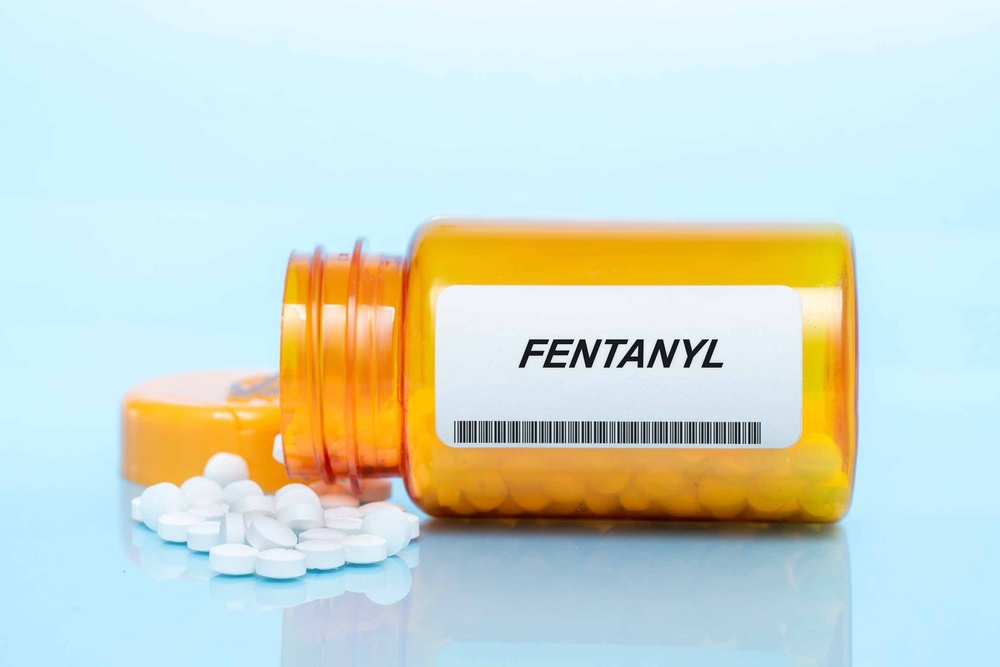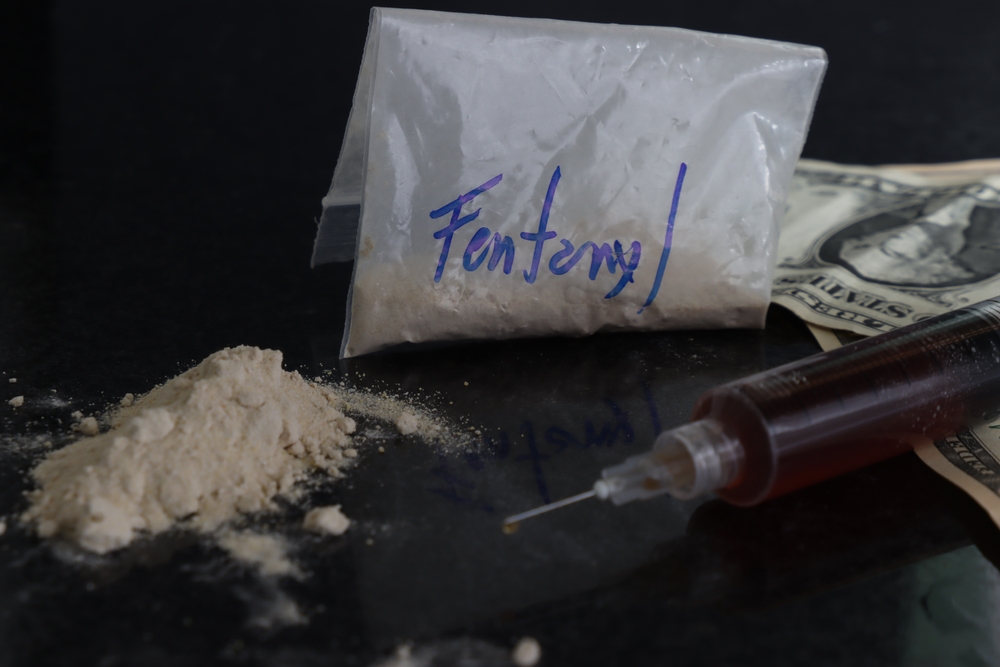Last Updated:
May 16th, 2025
Fentanyl Addiction | Symptoms, Effects and Causes
Fentanyl has become one of the most infamous drugs in the world due to the number of fentanyl-related deaths in North America. While the UK has not experienced the same levels of harm, almost 400 people died from fentanyl poisoning in England and Wales between 2017 and 2022. The WHO described the fentanyl situation in America as a “public health crisis”, and constant vigilance is crucial to prevent the same happening in Britain. Understanding the deadly risks of fentanyl, as well as addiction signs and symptoms to look out for, is crucial for keeping individuals and the wider British public safe.

What is fentanyl?
Fentanyl is one of the most potent painkillers used in medicine today, designed to treat intense pain typically seen in cancer patients or following major surgeries. Like other opioids, it locks onto your opioid receptors, drastically elevating dopamine, a chemical linked to pain relief and feelings of pleasure. Fentanyl’s exceptional strength is estimated to be nearly 100 times that of morphine, which makes it very effective for pain control but also highly addictive for those who misuse it.
Medicinal fentanyl comes in skin patches, pills, lozenges and injectable solutions, but street fentanyl is usually a powder which is snorted or injected. Fentanyl is also frequently added to pills that look like legitimate prescriptions or mixed into other illicit drugs like heroin, cocaine or meth to enhance their effects without noticeably altering their appearance. This stealthy inclusion boosts dealers’ profits but significantly raises the danger of fentanyl overdose for unwitting users.
What is fentanyl addiction?
Fentanyl addiction is a deeply troubling condition when a person feels powerless to stop using fentanyl, despite its destructive effects. Addiction to fentanyl can develop extremely quickly due to its potency, causing massive issues before the person is even aware there is a problem.
Fentanyl addiction can start in various different ways. Some people may have become addicted to their opioid medicine and turn to street fentanyl when their prescription runs out. Others who become addicted may not even have known they were taking fentanyl at all if it was used to cut other drugs.
Either way, because fentanyl is so strong, the initial physical dependency can set in after using it just a few times. At this point, fentanyl cravings can become overwhelming and trying to quit can make you very sick (known as fentanyl withdrawal).
But fentanyl addiction isn’t just a physical need; the drug can soon exert a psychological hold, too. This means that the mind constantly craves the effects of fentanyl which makes quitting seem impossible.
The warning signs of fentanyl addiction
Taking fentanyl even once can be deadly but chronic use due to fentanyl addiction greatly increases the risk of death. That is why it is imperative you spot the warning signs of fentanyl addiction early in yourself or anyone you know who is using fentanyl. Here are some of the most common fentanyl addiction symptoms which should act as a warning:
- Stealing money or committing other crimes to fund fentanyl use
- Giving up work or school, being fired or other social issues because of fentanyl
- Experiencing cravings and fentanyl withdrawal symptoms when you haven’t used
- Lying to parents, partners, friends and family about fentanyl use
- Wanting to quit fentanyl but being unable to even cut down
- Putting yourself at risk by using fentanyl from unknown sources
- Knowing deep down that you have a problem but not being able to stop using

These signs of fentanyl addiction can serve as a wake-up call to anyone who is in denial. While seeking help for fentanyl addiction can be daunting, the reality of fentanyl addiction is far scarier.
What causes fentanyl addiction?
As explained above, fentanyl is designed to be very powerful, and this comes with an inherently high risk of users becoming dependent. But why do only some people become addicted and not others? Here are some of the risk factors:
The mental and physical dangers of fentanyl addiction
Fentanyl addiction seriously harms every part of a person’s health. Here are some of the most dangerous potential problems:
- Fentanyl overdose: A fentanyl overdose is incredibly serious as it can cause fatal respiratory depression. The line crossed to fentanyl overdose is so thin that even what seems like a tiny amount can potentially kill you or cause lasting brain damage.
- Stomach and digestion issues: Fentanyl can also cause various stomach problems like vomiting and constipation, which are uncomfortable and can lead to more severe health issues if not managed properly.
- Heart and blood vessel problems: Fentanyl can make your heart beat faster or slower, raise your blood pressure and even cause a fatal heart attack or stroke.
- Mental health challenges: Long-term use of fentanyl can worsen or even cause new mental health problems, like paranoia, anxiety and depression.
Higher chance of getting infections: Using fentanyl, especially by injection, can increase the risk of infections due to sharing needles or having unprotected sex after using.
How to overcome fentanyl addiction
Treatment for fentanyl addiction begins with detoxification, a medically-led process where doctors guide you in gradually reducing your drug intake. The fentanyl detox process typically includes a method known as tapering, often supplemented by medications like methadone, which help ease the discomfort of fentanyl withdrawal symptoms.
The next step is fentanyl rehab for the emotional and mental triggers of fentanyl addiction. You can find rehab programmes through the NHS or at one of the UK’s many private recovery centres. The best type of rehab usually involves staying at the centre, as it allows you to focus completely on getting better without any distractions.
How to get help for fentanyl addiction
If you or someone you care about is battling fentanyl addiction, know that help is closer than you think. At Addiction Helper, we are dedicated to finding the right fit for your recovery. Fentanyl addiction is tough, but with the right support, recovery is very possible. Get in touch with us today to explore all the options available to you.
Our compassionate team are ready and available to take your call, and guide you towards lasting the lasting addiction recovery you deserve.
Frequently Asked Questions
(Click here to see works cited)
- DEA.gov. “Fentanyl.” DEA.gov, https://www.dea.gov/factsheets/fentanyl. Accessed 15 January 2025.
- National Crime Agency. “Recent Deaths Possibly Linked to Fentanyl.” National Crime Agency, 2017, https://www.nationalcrimeagency.gov.uk/who-we-are/publications/7-recent-deaths-possibly-linked-to-fentanyl. Accessed 31 March 2024.
- National Institute on Drug Abuse. “Fentanyl DrugFacts.” National Institute on Drug Abuse, 1 June 2021, https://nida.nih.gov/publications/drugfacts/fentanyl. Accessed 15 January 2025.
- UK-Rehab. “Opiates – Addiction To Fentanyl Information | UK Rehab.” UK-Rehab, https://www.uk-rehab.com/opiate-addiction/fentanyl/. Accessed 15 January 2025.
Vankar, Preeti. “Fentanyl overdose deaths U.S. 1999-2021.” Statista, 4 March 2024, https://www.statista.com/statistics/895945/fentanyl-overdose-deaths-us/. Accessed 15 January 2025. - Stewart, Conor. “Number of deaths from drug poisoning by fentanyl in England and Wales from 1999 to 2022.” Statista, 29 January 2024, https://www.statista.com/statistics/470910/death-by-fentanyl-drug-poisoning-in-england-and-wales/. Accessed 15 January 2025.
- UK Addiction Treatment Centres. “Fentanyl addiction | Fentanyl abuse signs and symptoms | UKAT.” UK Addiction Treatment Centres, 25 October 2023, https://www.ukat.co.uk/addiction/drug/prescription/opiate/fentanyl/. Accessed 15 January 2025.

